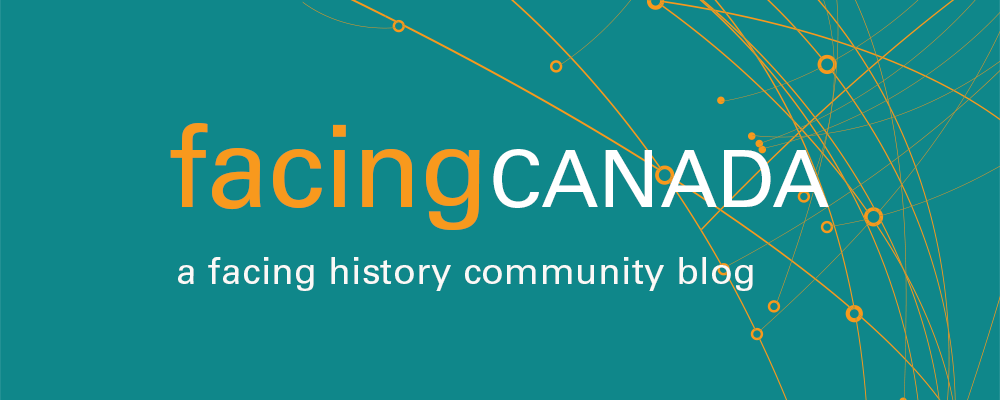At the release of the Truth and Reconciliation Commission of Canada’s final report, the call to educate all Canadians about the treatment and legacy of Residential Schools was loud and clear.
Facing History high school teacher Cheryl Payne-Stevens embarked on this important (and daunting!) task with her students and shared her experience with us:
The responsibility for learning this history must be held by all Canadians, but educators are critical to ensuring that this history is taught in a safe and honest way; where the complexity and humanity in our history, and the contemporary legacies of the Residential Schools are confronted. In teaching this difficult history, students must recognize that the responsibility, and agency exists in each of us to be a part of moving reconciliation forward.
An Essential Question for Exploration
The essential question that students grapple with in this series of lessons on Canada’s Residential Schools is this: “What evidence from the history and legacies of Canada's residential schools supports the application of the legal charge of genocide? What actions can individuals and groups take today to address the legacies of attempted erasure, loss and injustice?”
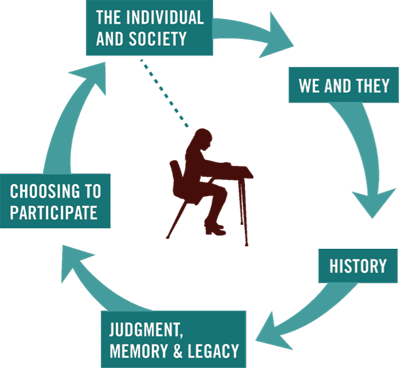
Facing History and Ourselves' Scope and Sequence approach to historical case studies
Beginning with Identity
Using Facing History’s Scope and Sequence to frame my approach, students start with an examination of the numerous identities found within the Indigenous communities in Canada as well as their worldviews. We begin with identity rather than launching right into the history of the Residential School system and this is an essential step in the lessons. Ojibway (Leech Lake) author David Treuer reminds us:
“Maybe it’s because I”m a literature professor but I feel like in a really simple way, that words shape the world. Stories shape the reality that we inhabit - and by only telling certain kinds of stories, that means we can only see certain things, which means consequently we can only imagine certain futures and no others. And this is political but it’s also really personal.
…We could focus on that laundry list of pain and we have reason to do that. But we have been existing as more than victims of history. We have been making our own history. We have been actors in our own lives…”
It is imperative that students encounter many historic and contemporary stories before, and throughout a unit examining the history of residential schools. It enables my class to see Indigenous people as individuals with whom they can connect, as opposed to as victims. As a result, students are more empathetic and willing to seriously consider the short and long-term impact of having their own identities denied and destroyed.
Understanding the Historical Roots of Canada’s Residential Schools
Then we examine the creation of “we” and “they” in the early 20th century. We explore who was a member of the dominant culture, their rights and privileges alongside the rights denied to those considered “other.” Today, Canada is often ranked one of the top countries in the world to live. Students struggle to understand how a country that is often praised by the international community for its living standard and advocacy of human rights could create a program that would deliberately destroy these rights for a segment of its population. So we look at the roles that prejudice and systemic racism played in the creation of the Residential School System, a system that was created to assimilate Indigenous children into a mainstream culture with the hope that this would end Canada’s “Indian problem.” We can also examine the active resistance of Indigenous peoples to land encroachment and systemic racism. For example, highlighting the work of the 1906 BC Delegation to Ottawa and London, UK.
Creating a Historical and Human Understanding of Residential Schools
To bring this history alive, I take my students to The Woodland Cultural Centre in Brantford. Here, students take a tour with a survivor of the former Mohawk Institute Residential School that operated from 1831-1970.
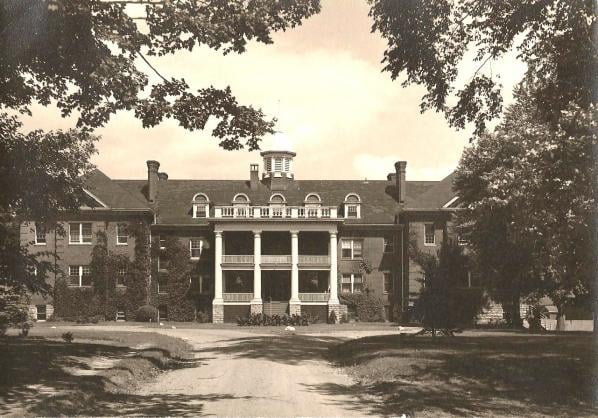
The Woodland Cultural Centre. Photo credit: Woodland Cultural Centre
Before going, I prompt my class to consider how we might reconcile with the injustices of the past and create a better society. A survivor testimony is essential to building the understanding necessary for students to answer this question. The residential school survivor who gave her testimony during our recent visit helped my students understand that the physical, emotional and sexual abuse perpetrated in residential schools not only destroyed the lives of children and families during the time of the Residential Schools, but that the abuses still have implications on Indigenous communities today.
Learning from a survivor humanizes this history and motivates our students to make a change. Hearing familiar stories of childhood and friendship, stories of resistance, and forming a relationship with a living person enables students to situate stories of trauma and injustice within the context of a human experience and living survivor. During our last trip, the survivor thanked our students for listening and helping her along her healing journey. Several of the students were incredulous and one had the courage to question her about this. She explained to him that every time that she tells her testimony, she heals a little more. Not only does she heal but she is empowered by the youth that listen to her because she knows that they will educate others and will help create a more cohesive and caring society. The students were impressed. In fact, when we came back to the school to debrief they all wanted to discuss her healing journey and their place within it.
Debriefing the Visit
As a debrief activity, I use a modified Found Poem strategy. Instead of working with a text, I have students in small groups create a found poem based on the survivor testimony. Students also take time to reflect on their experience with the survivor in their journals before answering the essential question.
Entrusting Students with Agency and Responsibility for Reconciliation
I am a big proponent of asking students to share their learning beyond the classroom. The learning is deep and I want a meaningful activity to showcase this. As a class we decided to highlight the legacies of the Residential School system for the school and to encourage others to join the class in making a difference.
Students worked in small groups to create VERY big graphic organizers addressing the intergenerational impacts of the Residential School system - mental health issues, loss of language, distrust. For example, one group examined the legacy of abuse while another chose to examine the impact of emotional trauma. On each organizer, students brought the voices of the past to our hallways and also highlighted the stories of upstanders like Wab Kinew and Gabrielle Scrimshaw.
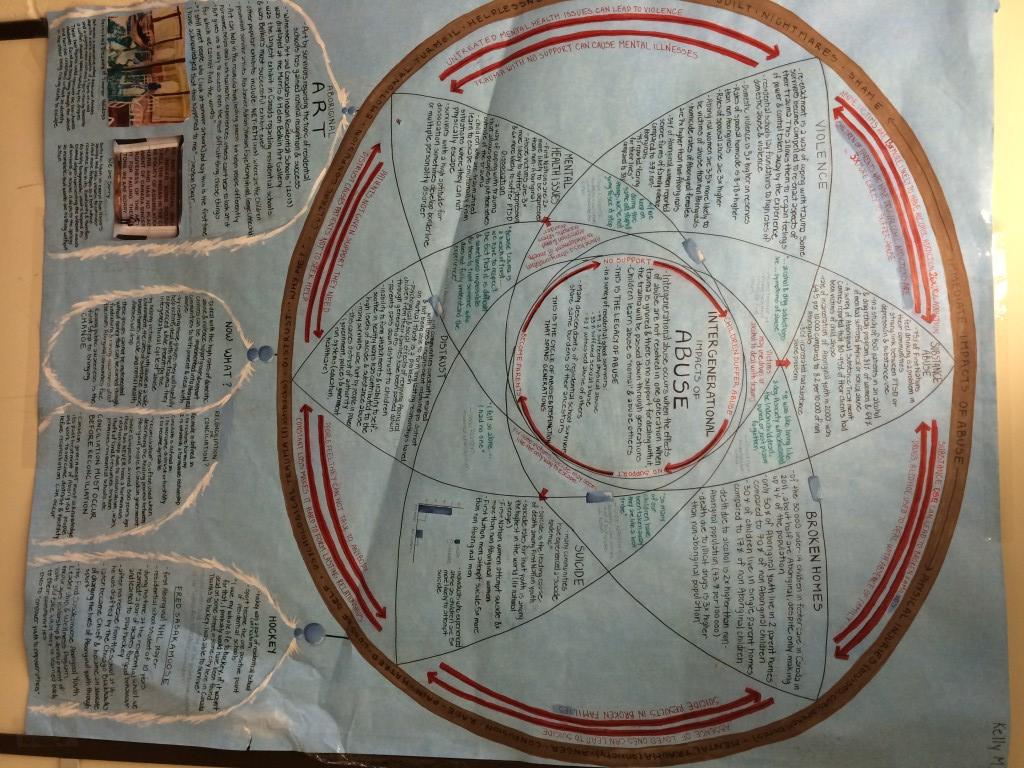
Student poster: Intergenerational Impacts of Abuse
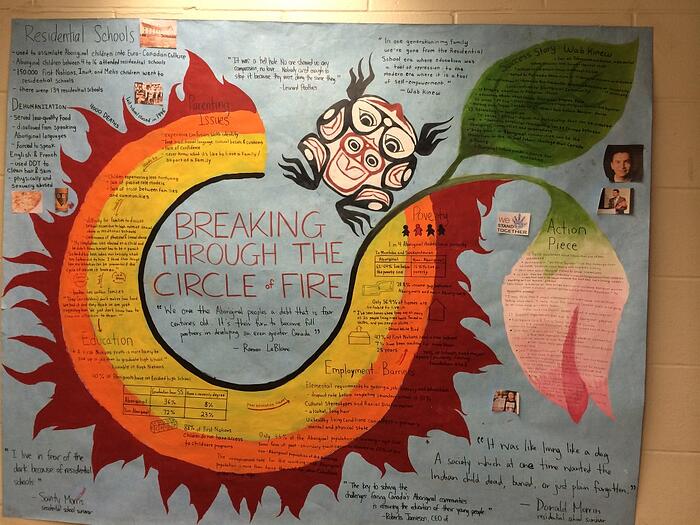
Student Poster: Breaking Through the Circle of Fire
As part of the Choosing to Participate segment of Facing History’s Scope and Sequence, students also prompted readers to make a difference – one group provided information on The Woodland Cultural Centre’s fundraising efforts to restore the former residential school, while others directed students to sign a petition from Amnesty International asking the Canadian government to create a National Action Plan to investigate missing and murdered Indigenous women and to stop this violence. Once all of the posters were hung in the hallway of our school, our hallway became a call to action.
The survivor we met thanked us for helping her along her journey. We would like to thank her for starting ours.
At Facing History and Ourselves Canada, we are committed to facing this important history and bringing it into high schools. In the fall we will be publishing a new teacher resource book and providing online resources that will help teachers bring the history of Canada’s Residential Schools into classrooms. We will also be offering educator workshops. Please leave a reply or email leora_schaefer@facing.org if you would like to learn more.
